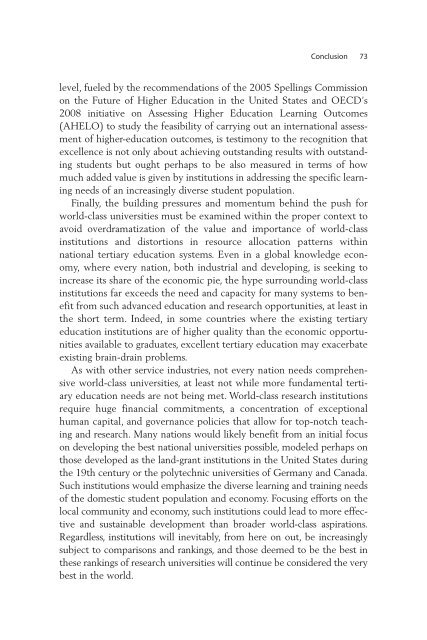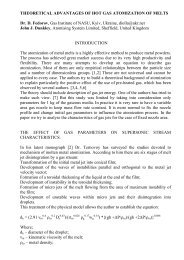The Challenge of Establishing World-Class Universities
The Challenge of Establishing World-Class Universities - ISBN ...
The Challenge of Establishing World-Class Universities - ISBN ...
- No tags were found...
You also want an ePaper? Increase the reach of your titles
YUMPU automatically turns print PDFs into web optimized ePapers that Google loves.
Conclusion 73<br />
level, fueled by the recommendations <strong>of</strong> the 2005 Spellings Commission<br />
on the Future <strong>of</strong> Higher Education in the United States and OECD’s<br />
2008 initiative on Assessing Higher Education Learning Outcomes<br />
(AHELO) to study the feasibility <strong>of</strong> carrying out an international assessment<br />
<strong>of</strong> higher-education outcomes, is testimony to the recognition that<br />
excellence is not only about achieving outstanding results with outstanding<br />
students but ought perhaps to be also measured in terms <strong>of</strong> how<br />
much added value is given by institutions in addressing the specific learning<br />
needs <strong>of</strong> an increasingly diverse student population.<br />
Finally, the building pressures and momentum behind the push for<br />
world-class universities must be examined within the proper context to<br />
avoid overdramatization <strong>of</strong> the value and importance <strong>of</strong> world-class<br />
institutions and distortions in resource allocation patterns within<br />
national tertiary education systems. Even in a global knowledge economy,<br />
where every nation, both industrial and developing, is seeking to<br />
increase its share <strong>of</strong> the economic pie, the hype surrounding world-class<br />
institutions far exceeds the need and capacity for many systems to benefit<br />
from such advanced education and research opportunities, at least in<br />
the short term. Indeed, in some countries where the existing tertiary<br />
education institutions are <strong>of</strong> higher quality than the economic opportunities<br />
available to graduates, excellent tertiary education may exacerbate<br />
existing brain-drain problems.<br />
As with other service industries, not every nation needs comprehensive<br />
world-class universities, at least not while more fundamental tertiary<br />
education needs are not being met. <strong>World</strong>-class research institutions<br />
require huge financial commitments, a concentration <strong>of</strong> exceptional<br />
human capital, and governance policies that allow for top-notch teaching<br />
and research. Many nations would likely benefit from an initial focus<br />
on developing the best national universities possible, modeled perhaps on<br />
those developed as the land-grant institutions in the United States during<br />
the 19th century or the polytechnic universities <strong>of</strong> Germany and Canada.<br />
Such institutions would emphasize the diverse learning and training needs<br />
<strong>of</strong> the domestic student population and economy. Focusing efforts on the<br />
local community and economy, such institutions could lead to more effective<br />
and sustainable development than broader world-class aspirations.<br />
Regardless, institutions will inevitably, from here on out, be increasingly<br />
subject to comparisons and rankings, and those deemed to be the best in<br />
these rankings <strong>of</strong> research universities will continue be considered the very<br />
best in the world.







